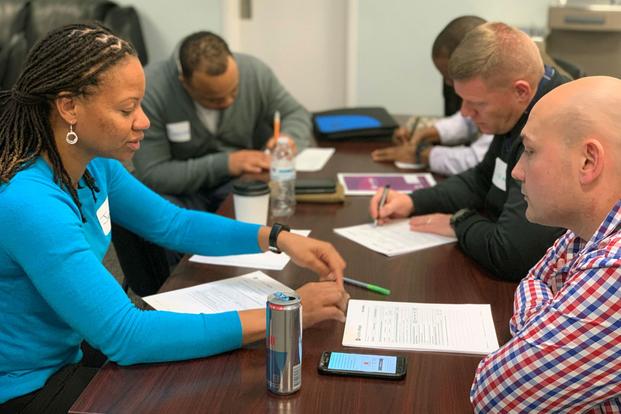Whether you find a mentor through a formal program or you casually develop a relationship with someone who helps you along, there's a right way and a wrong way to extract value from your mentor.
A mentor is someone who volunteers to guide you, offering advice, resources, support, connections and knowledge that helps you in your career. Many formal programs offer mentoring in six-month or one-year agreements. Others are more informal, or "as needed" -- offering mentoring services to veterans who need periodic guidance.
Since a mentor is a volunteer and isn't being paid to coach, guide and refer you, it's easy for mentees to take a lackadaisical approach to the relationship. Instead, by following these suggestions, you'll find the relationship to be a valuable success factor in your civilian career:
1. Know Your Mentor.
Learn their background, skills and competencies. Before you begin a mentoring relationship, research the person with whom you'll be speaking.
Even if your mentoring meeting is a one-time phone call, by knowing what your mentor is qualified to speak on (industries, topics, causes, etc.) and what they are passionate about (what do they care about?), you'll be in a better position to drive the discussion toward value for you.
Your mentor wants to leverage their skills, tools and knowledge to help you. If you ask for insight or guidance in areas they aren't versed, you'll frustrate both your mentor and you.
2. Have a Goal.
During your first mentoring call or meeting, set a goal for the relationship. Are you seeking guidance to make a smooth military-to-civilian transition? Do you need help setting up a business? Are you looking for tips for making friends as a student veteran? Do you need help building your personal brand?
When you come into the relationship with a clear goal or two, your mentor is in a better position to help you get there. Sticking to the goal may not be a linear process, however. Permit your mentor to ask questions that might seem off-topic or offer input that seems irrelevant. You're seeking advice from your mentor and sometimes they can see further down your career path than you can. Trust the process.
3. Set Expectations.
How often will you meet? Will your mentor respond to emails or texts between meetings? How much is too much to ask?
Clarifying expectations at the outset of the relationship will help avoid those awkward conversations about crossing boundaries or feelings of being taken advantage of by your mentor.
They want to help you succeed, but the lines of the mentoring relationship can blur over time unless you both agree to parameters. Once expectations are set, respect all boundaries. Be on time and prepared for each meeting or call, take good notes and follow up on all action items agreed to in the meeting.
4. Know Their Limits.
If in the past, you've asked your mentor for referrals or introductions and they've resisted, stop asking. Perhaps you haven't established enough credibility or trust with them to warrant them referring you to their prime contacts.
If you haven't asked before, inquire whether they are OK with you using their name to reach out to their connections or if they would be comfortable making an introduction for you.
Similarly, be careful asking for help that crosses the line of tolerance for your mentor. Enlisting them to become your therapist, best friend or social companion is not appropriate and puts you both in an awkward spot. Adhere to the goals and expectations set at the beginning of the relationship.
5. Reciprocate.
Your mentor is not looking for you to mentor them in return for their guidance, but some form of reciprocation is deserved. Saying thank you periodically or writing a handwritten thank-you note shows that you recognize the commitment they've made to your success and appreciate the effort.
Also be sure to keep your mentor updated on your progress. It is disheartening for a mentor to invest time advising you, only to wonder how their advice worked or whether you are doing well. A quick update note by email or LinkedIn messages lets them know you are OK.
As someone who spends many hours each month mentoring veterans, I can tell you it is a tremendously valuable and rewarding experience. I feel that I learn from my mentees as I share insights, guidance, knowledge and resources about my own work and experiences.
Find the Right Veteran Job
Whether you want to polish your resume, find veteran job fairs in your area or connect with employers looking to hire veterans, Military.com can help. Sign up for a free Military.com membership to have job postings, guides and advice, and more delivered directly to your inbox.
















